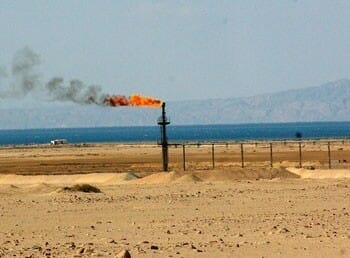Cairo/ Brussels May 27, 2013
 On Wednesday 29 May, the European Bank for Reconstruction & Development (EBRD) will vote on whether to make a $40 million loan to Kuwait Energy to drill and extract oil in Egypt. Egyptian and international organisations are pushing the board of the public multilateral bank to reject the loan – or at least postpone its decision.
On Wednesday 29 May, the European Bank for Reconstruction & Development (EBRD) will vote on whether to make a $40 million loan to Kuwait Energy to drill and extract oil in Egypt. Egyptian and international organisations are pushing the board of the public multilateral bank to reject the loan – or at least postpone its decision.
As the board prepares to vote, a coalition of NGOs has published a briefing warning the EBRD not to finance Kuwait Energy. The coalition includes the Egyptian Center for Economic & Social Rights and the Egyptian Initiative for Personal Rights in Cairo and CEE Bankwatch Network and Platform in Europe.
Oil company Kuwait Energy is seeking the loan to fund its operations in Egypt and Ukraine. The company is drilling for oil in five areas in Egypt, including on the edge of the Red Sea, in Upper Egypt on the border with Sudan and in the desert near Marina on the North Coast.
The briefing reveals that
- The EBRD failed to properly identify the beneficiary of the loan, or the country where it is incorporated (the tax haven Jersey).
- The fossil fuel nature of Kuwait Energy’s drilling will fail to improve development or social justice in Egypt. While the EBRD claims to prioritise renewable energy, the reality shows a commitment to further oil & gas extraction, one of the few sectors that can easily attract capital.
- The EBRD’s miscategorisation of this project as unlikely to have major impacts enabled the bank to avoid adequate impact assessments or due diligence
- By focusing merely on disclosing revenue payments and not ensuring oil contracts are published, the EBRD is effectively undermining international best practices on transparency.
- The loan is presented as a means to reduce heavily polluting gas flaring. However, these will make up only a small part of the project, if they take place at all. The briefing argues that the “gas flaring” element was used to disguise a loan essentially geared towards general oil extraction operations.
Download the briefing and the NGO letter to the EBRD’s board.
The EBRD is also currently considering a major loan to the controversial Citadel Capital refinery in Cairo. Concerns have been raised about the lack of consultation with local communities, forced evictions and pollution of Cairo, contributing to the EBRD’s decision being repeatedly postponed.
The EBRD’s plans for Egyptian have received public opposition and criticism. Its vision of accelerated privatisation, either outright or in the form of Public-Private-Partnerships, would increase poverty and inequality, while weakening both social justice and democracy. The EBRD aims to expand Mubarak-era policies of economic neoliberalism, which is described as a “success story”, despite the rampant corruption.
“

The EBRD claims to be a bank of transition, but by supporting an oil company registered in a tax haven, it only perpetuates the patterns of the past in Egypt. Its haste in investing in the Arab Spring countries reveals that the Bank is not ready to seriously take into account the will of the people and the spirit of the revolution and thus cast serious doubts on the legitimacy of its intervention in the region.” comments Anne-Sophie Simpere from CEE Bankwatch Network
“The EBRD continues to ignore calls by the Egyptian civil society to reconsider its strategy in Egypt, which is designed to promote the same investment policies that have had severe negative impacts on the economic and social conditions of the Egyptian people” says Mohammed Mossallem from the Egyptian Initiative for Personal Rights. “Furthermore, their initial investment targets in the form of: the expansion of the Mostorod Refinery project, an existing fossil fuel project in violation of the social rights its surrounding community; and financing the field development plans of Kuwait Energy Company, an existing reserve based facility, clearly contradict their claimed objectives of investing in clean energy projects and in having a developmental impact.”
“Today, with widespread documentation of ongoing human rights abuses in the country that some observers deem to be worse than during the Mubarak era, Egypt in no way complies with the minimum principles of democracy, human rights, and pluralism enshrined in Article 1 of the Agreement Establishing the EBRD. Indeed, since the EBRD country assessment for Egypt, approved on 31 October 2012, the situation with regards to Article 1 has continued to deteriorate.” stated Mahinour El-Badrawi, of the Egyptian Center for Economic and Social Rights. “If the EBRD is to live up to its standards, it should not be financing dictatorships. Instead, EBRD and its European Country Shareholders should respect the EU Parliament resolution issued in April this year withhold(ing) budget support for Egypt due to lack of ‘respect for human rights, democracy and (lack of good) economic governance’.”
Platform – Egyptian Center for Economic & Social Rights
Egyptian Initiative for Personal Rights– CEE Bankwatch Network